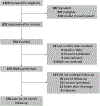Maternal Prenatal Risk Phenotypes and Neurobehavioral Outcomes among Infants Born Very Preterm
- PMID: 37244578
- PMCID: PMC10527115
- DOI: 10.1016/j.jpeds.2023.113521
Maternal Prenatal Risk Phenotypes and Neurobehavioral Outcomes among Infants Born Very Preterm
Abstract
Objective: To assess whether prenatal risk phenotypes are associated with neurobehavioral impairment for children born <30 weeks of gestation at discharge from the neonatal intensive care unit (NICU) and at 24-month follow-up.
Study design: We studied infants from the Neonatal Neurobehavior and Outcomes in Very Preterm Infants (NOVI) study, a multisite investigation of infants born <30 weeks of gestation. There were 704 newborns enrolled in the NOVI study; of these, 679 (96%) had neonatal neurobehavioral data and 556 (79%) had 24-month follow-up data. Maternal prenatal phenotypes (physical and psychological risk groups) were characterized from 24 physical and psychological health risk factors. Neurobehavior was assessed at NICU discharge using the NICU Network Neurobehavioral Scales and at 2-year follow-up using the Bayley Scales of Infant and Toddler Development and the Child Behavior Checklist.
Results: Children born to mothers in the psychological risk group were at increased risk for dysregulated neonatal neurobehavior (OR, 2.04; 95% CI, 1.08-3.87) at NICU discharge, and for severe motor delay (OR, 3.80; 95% CI, 1.48-9.75), and clinically significant externalizing problems (OR, 2.54; 95% CI, 1.15-5.56) at age 24 months, compared with children born to mothers in the low-risk group. Children born to mothers in the physical risk group were more likely to have severe motor delay (OR, 2.70; 95% CI, 1.07-6.85) compared with the low-risk group.
Conclusions: High-risk maternal prenatal phenotypes were associated with neurobehavioral impairment for children born very preterm. This information could identify newborns at risk for adverse neurodevelopmental outcomes.
Keywords: neurobehavior; phenotype; prenatal; preterm birth; risk factor.
Copyright © 2023 Elsevier Inc. All rights reserved.
Conflict of interest statement
Declaration of Competing Interest This work was funded by the National Institutes of Health (NIH)/Eunice Kennedy Shriver National Institute of Child Health and Human Development (NICHD) grant R01HD072267 (to B.M.L. and T.M.O.S.). M.C. was additionally supported by career development award from the National Institutes of Mental Health (NIMH), grant K01MH129510. The authors declare no conflicts of interest.
References
-
- Stephens BE, Vohr BR. Neurodevelopmental Outcome of the Premature Infant. Pediatr Clin North Am 2009; 56:631–646. - PubMed
-
- Allen MC. Neurodevelopmental outcomes of preterm infants. Curr Opin Neurol 2008;21:123–128. - PubMed
-
- Vohr BR. Neurodevelopmental Outcomes of Extremely Low Birth Weight Infants <32 Weeks’ Gestation Between 1993 and 1998. Pediatrics 2005; 116:635–643. - PubMed
-
- Burnett AC, Youssef G, Anderson PJ, Duff J, Doyle LW, Cheong JLY. Exploring the “preterm Behavioral Phenotype” in Children Born Extremely Preterm. J Dev Behav Pediatr 2019; 40:200–207. - PubMed
Publication types
MeSH terms
Grants and funding
LinkOut - more resources
Full Text Sources


